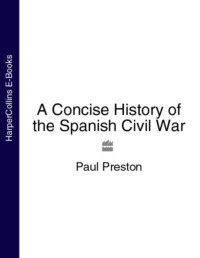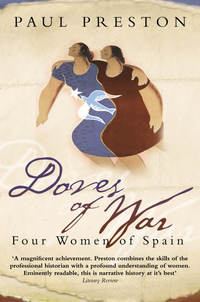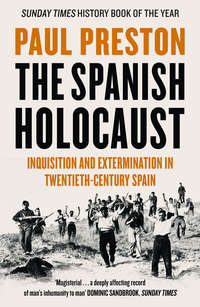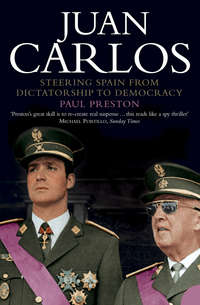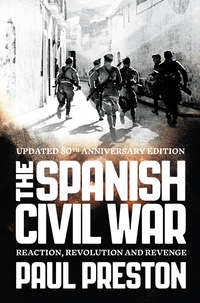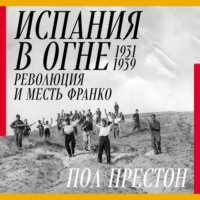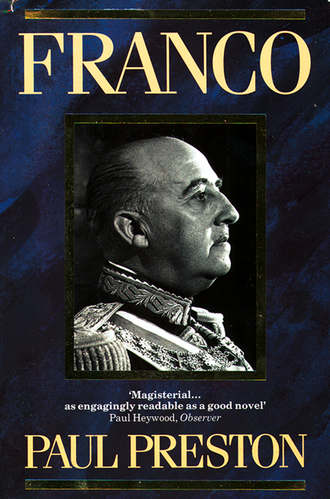
Полная версия
Franco
Since Varela was also standing in the simultaneous rerun at Granada, José Antonio Primo de Rivera shrewdly wished to avoid his chances of election being diminished if the rightist eagerness for military candidates were too transparent. He also, in the wake of his unfortunate meeting with Franco before the February elections, regarded the general as likely to be a disaster in the Cortes. He threatened to withdraw from the Cuenca list if Franco’s name was not removed, something which Gil Robles felt unable to do. Efforts by various right-wing leaders including Serrano Suñer failed to persuade the Falange leader to withdraw his opposition to Franco. José Antonio said to Serrano Suñer: ‘This is not what he’s good at and, given that what is brewing is something more conclusive than a parliamentary offensive, let him stay in his territory and leave me where I have already proved myself’. Serrano was then obliged to inform Franco. He managed to persuade his brother-in-law that he would not take well to the cut-and-thrust of parliamentary debate. The argument that Franco would be risking public humiliation did the trick. On 27 April, Franco withdrew and Manuel Casanova returned to the list.17 Franco was aware of the Falangist leader’s hostility to his candidacy and subsequent events would show that he neither forgave nor forgot.
The Left, and Prieto in particular, were concerned that Franco planned to use his parliamentary seat as a base from which to engage in military plotting. This was a reasonable interpretation and was indeed adopted by Francoist propaganda once the Civil War was under way. However, it is not clear whether Franco’s quest for a parliamentary seat was motivated by the need to effect his transfer from the Canary Islands to the mainland in order to play a key role in the conspiracy or by more selfish motives. Gil Robles suggested that the desire to go into politics reflected Franco’s doubts about the success of a military rising. As yet undeclared vis-à-vis the conspiracy, he wanted a safe position in civilian life from which to await events.18 Fanjul confided a similar opinion to Basilio Alvarez, who had been a Radical deputy for Orense in 1931 and 1933: ‘perhaps Franco wants to protect himself from any governmental or disciplinary inconvenience by means of parliamentary immunity.’19
Certainly, the versions of the Cuenca episode produced by Franco and his propagandists make it clear that it was to be an abiding source of embarrassment. Within a year, Franco was to be found rewriting it, through his official biographer Joaquín Arrarás. In his 1937 version, the parties of the Right offered Franco a place in the list for Cuenca, because he was a persecuted man and to allow him the freedom ‘to organize the defence of Spain’. Franco ‘publicly rejected’ the offer because he neither believed in the honesty of the election process nor expected anything from the Republican parliament.20 This ludicrously inaccurate version of the events surrounding the Cuenca elections implied that, if the electoral system had been honest, Franco would have stood. Subsequently in 1940, Arrarás eliminated this inadvertent proclamation of faith in democracy and claimed that Franco had withdrawn his candidacy because of ‘the twisted interpretations’ to which it was subject.21 A decade after the events, Franco himself claimed in a speech to the Falangist Youth in Cuenca that his desire to be a parliamentary deputy was occasioned by ‘dangers for the Patria’.22
By the early 1960s, Franco was eschewing any hint that he might have been seeking a bolt-hole. Writing in the third person, he claimed rather that ‘General Franco was looking for a way of legally leaving the archipelago which would permit him to establish a more direct contact with the garrisons in order to have a more direct link with those places where there was a danger of the Movement being a failure’. There is an outrageous re-casting of history in this account. Franco attributes to himself the credit for securing a place for José Antonio Primo de Rivera in the right-wing candidacy, which is simply untrue. With equal inaccuracy, he claims that General Fanjul had stood down as a candidate to make way for Franco himself when he had done so for José Antonio. He then fudges the reasons for the eventual withdrawal of his own candidacy with the vague and incorrect statement that, on the morning that candidates were to be announced, he received a telegram from those concerned (los afectados) to the effect that ‘it was impossible to maintain his candidacy because his name had been ‘burned’ (quemado).23
That Franco should omit to mention the rift with the leader of the Falange was entirely understandable. After all, after 1937, the Nationalist propaganda machine would work frenetically to convert Franco into the heir to José Antonio in the eyes of the Falangist masses. Similarly, in writing that his intention was to be able to oversee the preparations for a coup, Franco inadvertently revealed his desire to diminish Mola’s posthumous glory as the sole director of the rising. In his third and most plausible attempt to rewrite the Cuenca episode, Arrarás wrote that Franco withdrew ‘because he preferred to attend to his military duties, by which means he believed he could better serve the national interest’. The suggestion of any friction between Franco and José Antonio Primo de Rivera remained taboo.24
Left-wing suspicions of Franco’s motives were expressed by Indalecio Prieto shortly after Franco’s candidacy was dropped, in a celebrated speech in Cuenca. He commented that ‘General Franco, with his youth, with his gifts, with his network of friends in the Army, is a man who could at a given moment be the caudillo of a movement with the maximum chances of success’. Accordingly, without attributing such intentions to Franco, Prieto claimed that other right-wing plotters were seeking to get parliamentary immunity for him in order to facilitate his conversion into ‘the caudillo of a military subversion’.25 In any case, the Cuenca election was declared at the last minute to be technically a re-run. Since the electoral law required that candidates in a re-run should have secured 8 per cent of the vote in the first round, new candidates could not be admitted by the provincial Junta del Censo. Accordingly, although José Antonio Primo de Rivera gained sufficient votes to win a seat, his election was not recognized.26
Helpless before the rising numbers of strikes and deaf to the background hum of military conspiracy stood the minority government. Only Republicans sat in the Cabinet, because Largo Caballero refused to let Socialists join a coalition. He pinned his hopes on two naive scenarios: either the Republicans would quickly find themselves incapable of implementing their own reform programme and have to make way for an exclusively Socialist cabinet or else there would be a fascist coup which would be crushed by popular revolution. In May, Largo used his immense influence inside the Socialist leadership to prevent the formation of a government by the more realistic Prieto. As long as Azaña was prime minister, authority could be maintained. However, in order to put together an even stronger team, Azaña and Prieto plotted to remove the more conservative Alcalá Zamora from the presidency. Azaña would become president and Prieto take over as prime minister. The first part of the plan worked but not the second as a result of Largo Caballero’s opposition and Prieto’s failure to fight it. The consequences were catastrophic. The last chance of avoiding civil war was missed. Spain lost a shrewd and strong prime minister, and, to make matters worse, on assuming the presidency, Azaña increasingly withdrew from active politics. The new Prime Minister, Santiago Casares Quiroga, suffering from tuberculosis, was incapable of generating the determination and energy required in the circumstances.
Unemployment was rocketing and the election results had dramatically raised the expectations of workers in both town and countryside. To the outrage of employers, trade unionists sacked in the aftermath of the Asturian events were forcibly reinstated. There were sporadic land seizures as frustrated peasants took into their own hands the implementation of the new government’s commitment to rapid reform. What most alarmed the landlords was that labourers whom they expected to be servile were assertively determined not to be cheated out of reform as they had between 1931 and 1933. Many landowners withdrew to Seville or Madrid, or even to Biarritz or Paris, where they enthusiastically joined, financed, or merely awaited news of, ultra-rightist plots against the Republic.
Under the energetic leadership of General Mola, the plot was developing fast. It was more thoroughly prepared than any previous effort, taking full account of the lesson of the Sanjurjada of 10 August 1932 that casual pronunciamientos could not work where the Civil Guard was in opposition and where the proletariat was ready to use the weapon of the general strike. The tall bespectacled Mola, as ‘El Director’, having learnt plenty of police procedure during his time as Director-General of Security in 1930–1931, took to conspiracy with gusto. Brave and of adventurous spirit, he enjoyed the danger.27 Pamplona was an excellent place from which to direct the conspiracy, being the headquarters of the most militant group of the ultra-Right, the Carlists.28 Mola had plenty of willing and competent assistants. Through Valentín Galarza, known among the plotters as ‘the technician’ (el técnico), the right-wing conspiratorial organization, Unión Militar Española, was at his disposal. He drew up his first directive in April, ‘The objective, the methods and the itineraries’. In it, aware of the deficiencies of the preparations of Sanjurjada, he specified in detail the need for a complex civilian support network and above all for political terror: ‘the action must be violent in the extreme in order to crush the strong and well-organized enemy as soon as possible. All leaders of political parties, societies or unions not committed to the Movement will be imprisoned and exemplary punishments administered to such individuals in order to strangle movements of rebellion or strikes’.29
In the middle of May, Mola was visited secretly by a Lieutenant-Colonel Seguí of the general staff of the African Army, who informed him that the garrisons of Morocco were ready to rise. Among the Africanista officers, Mola relied on Yagüe as the most tireless in the preparation of the rising in Morocco. In May too, Mola was in contact with a group of generals who would each play a crucial role in the Civil War: the brutal Gonzalo Queipo de Llano, head of the Carabineros (the Spanish frontier guards), the austere monarchist Alfredo Kindelán, the key link with conspirators in the Air Force and the easy-going Miguel Cabanellas, head of the Zaragoza military division.30 Franco was fully informed through Galarza. As part of the post-1939 propaganda effort to wipe away the memory of Franco’s minimal participation in the preparations, it was claimed that he carried on a twice-weekly correspondence with Galarza. These thirty coded letters have never been traced.31 In fact, Franco was anything but enthusiastic, commenting to the optimistically headstrong Orgaz, who had been banished to the Canary Islands in the early spring, ‘You are really mistaken. It’s going to be immensely difficult and very bloody. We haven’t got much of an army, the intervention of the Civil Guard is looking doubtful and many officers will side with the constituted power, some because it’s easier, others because of their convictions. Nobody should forget that the soldier who rebels against the constituted power can never turn back, never surrender, for he will be shot without a second thought’.32 At the end of May, Gil Robles complained to the American journalist H. Edward Knoblaugh that Franco had refused to head the coup, allegedly saying ‘not all the water in the Manzanares could wash out the stain of such a move’. Discounting the choice of a less than torrential river, this and other remarks suggest that the experience of the Sanjurjada of 1932 was on his mind.33 Not to be able to turn around or change his mind must have been Franco’s idea of hell.
With the conspiracy developing rapidly, Franco’s caution was stoking up the impatience of his Africanista friends. On 25 May, Mola had drawn up his second directive to the plotters, a broad strategic plan of regional risings to be followed by concerted attacks on Madrid from the provinces.34 Clearly, it would be an enormous advantage to have Franco as part of the team. Captain Bartolomé Barba was sent by Goded to the Canary Islands on 30 May to tell Franco to make his mind up and abandon ‘so much prudence’. Colonel Yagüe told Serrano Suñer that he was in despair at Franco’s mean-minded carefulness and his refusal to take risks.35 Serrano Suñer himself was baffled when Franco told him that what he really would have liked was to tranfer his residence to the south of France and direct the conspiracy from there. Given Mola’s position, there was no question of Franco organizing the rising. The clear implication was that he was more concerned with covering his personal retreat in the event of failure.36 This inevitably suggests that selfless commitment to the rising had not been his main reason for trying to stand for election in Cuenca.
The rationale for the conspiracy was the fear of the middle and upper classes that an inexorable wave of Godless, Communist-inspired violence was about to inundate society and the Church. Their panic was generated assiduously by the rightist press and by the widely reported parliamentary speeches of the insidious Gil Robles and the belligerent monarchist leader José Calvo Sotelo. Their denunciations of disorder found a spurious justification in the street violence provoked by the Falange’s terror squads. In their turn, the activities of Falangist gangs were financed by the same monarchists who were behind the military coup. The startling rise of the Falange was a measure of the changing political climate. Cashing in on middle class disillusionment with the CEDA’s legalism, the Falange expanded rapidly. Moreover, attracted by its code of violence, the bulk of the CEDA’s youth movement, the JAP, went over en masse. The rise of the Falange was matched by the ascendancy within the Socialist movement of Largo Caballero. Intoxicated by Communist flattery – Pravda had called him “the Spanish Lenin” – he undermined Prieto’s efforts at a peaceful solution. Largo toured Spain, prophesying the triumph of the coming revolution to crowds of cheering workers. The May Day marches, the clenched fist salutes, the revolutionary rhetoric and the violent attacks on Prieto were used by the rightist press to generate an atmosphere of terror among the middle classes and to convince them that only a military coup could save Spain from chaos.
Certain factors made the conspirators’ task much easier than it might otherwise have been. The government failed to act decisively on the repeated warnings that it received of the plot. At the beginning of June, Casares Quiroga, as Minister of War, set out to decapitate the conspiracy in Morocco by removing the officers in charge of the two Legions into which the Tercio was now organized. On 2 June, he sent for Yagüe who was head of the so-called Segunda Legión. On the following day, he removed Yagüe’s fellow-conspirator Lieutenant-Colonel Heli Rolando de Tella from command of the Primera Legión. When Yagüe was received by the Minister on 12 June, Casares Quiroga offered him a transfer either to a desirable post on the Spanish mainland or to a plum position as a military attaché abroad. Yagüe told Casares that he would burn his uniform rather than not be able to serve with the Legion. After giving him forty-eight hours to reconsider, Casares weakly acquiesced in Yagüe’s vehemently expressed desire to return to Morocco. It was a major political error given Yagüe’s key role in the conspiracy.37 A comparable stroke of luck protected the overall director of the plot. The Director-General of Security, Alonso Mallol, pointed the finger at Mola. On 3 June, Mallol made an unannounced visit to Pamplona with a dozen police-filled trucks and undertook searches allegedly aimed at arms smuggling across the French frontier. Having been warned of the visit by Galarza who in turn had been informed by a rightist police superintendent, Santiago Martín Báguenas, Mola was able to ensure that no evidence of the conspiracy would be found.38
The ineffective efforts of the Republican authorities to root out the conspirators helps explain one of the mysteries of the period, a curious warning to Casares Quiroga from the pen of General Franco. He wrote to the Prime Minister on 23 June 1936 a letter of labyrinthine ambiguity, both insinuating that the Army was hostile to the Republic and suggesting that it would be loyal if treated properly. The letter focused on two issues. The first was the recently announced reintegration into the Army of the officers tried and sentenced to death in October 1934 for their part in the defence of the Generalitat. The rehabilitation of these officers went directly against one of Franco’s greatest obsessions, military discipline.39 The second cause of Franco’s outrage was that senior officers were being posted for political reasons. The removal of Heli Rolando de Tella from the Legion and the near loss of Yagüe must have been on his mind. He informed the Minister that these postings of brilliant officers and their replacement by second-rate sycophants were arbitrary, breached the rules of seniority and had caused immense distress within the ranks of the Army. No doubt he regarded his own transfer from the general staff to the Canary Islands as the most flagrant case.
He then wrote something which, although absolutely untrue, was probably written with sincerity. In Franco’s value system, the movement being organized by Mola, and about which he was fully informed, merely constituted legitimate defensive precautions by soldiers who had the right to protect their vision of the nation above and beyond particular political regimes. ‘Those who tell you that the Army is disloyal to the Republic are not telling you the truth. Those who make up plots in terms of their own dark passions are deceiving you. Those who disguise the anxiety, dignity and patriotism of the officer corps as symbols of conspiracy and disloyalty do a poor service to the Patria.’ The anxieties which he shared with his brother officers about the law and order problem led Franco to urge Casares to seek the advice ‘of those generals and officers who, free of political passions, live in contact with their subordinates and are concerned with their problems and morale’. He did not mention himself by name but the hint was unmistakeable.40
The letter was a masterpiece of ambiguity. The clear implication was that, if only Casares would put Franco in charge, the plots could be dismantled. At that stage, Franco would certainly have preferred to reimpose order, as he saw it, with the legal sanction of the government rather than risk everything in a coup. In later years, his apologists were to spill many gallons of ink trying to explain away this letter either as a skilful effort by Franco the conspirator to put Casares off the scent and make him halt his efforts to replace subversives with loyal Republicans or else as a prudent warning by Franco the loyal officer which was stupidly ignored by the Minister of War.41 In fact, the letter had exactly the same purpose as Franco’s appeals to Portela in mid-February. Franco was ready to deal with revolutionary disorder as he had done in Asturias in 1934 and was now, in guarded terms, offering his services. If Casares had accepted his offer, there would have been no need for an uprising.
That was certainly Franco’s retrospective view.42 The government of the Popular Front did not share his commitment to suppressing the aspirations of the masses. In any case, Casares took no notice of him. If he had, the eventual outcome would certainly have been very different. If Franco was within his rights to send such a letter, Casares should have acknowledged his concern. If he believed that Franco had abused his position then Casares should have taken disciplinary measures against him. The Prime Minister’s failure to reply can only have helped to incline Franco towards rebellion.
Franco’s letter was a typical example of his ineffable self-regard, his conviction that he was entitled to speak for the entire army. At the same time, its convoluted prose reflected his retranca, the impenetrable cunning associated with the peasants of Galicia. At the time of writing, Franco was still distancing himself from the conspirators. His determination to be on the winning side without taking any substantial risks hardly set him apart as a likely charismatic leader although it did prefigure his behaviour towards the Axis in the Second World War. At the same time as he wrote to Casares, Franco also wrote to two Army colleagues. The first letter was to Colonel Miguel Campins, his assistant in the Zaragoza Academy, currently in command of a light infantry battalion in Catalonia. The other was to Colonel Francisco Martín Moreno, chief of the general staff of Spanish forces in Morocco with whom Franco had worked in early 1935 when he had been Commander-in-Chief there. The letters suggest clearly that Franco was not yet a committed conspirator, expressing merely his anxiety that the political situation might worsen to the point at which the Army would have to intervene. He asked if they would collaborate with him if such an occasion were to arise. Martín Moreno wrote back to say that, if Franco appeared in Tetuán, he would place himself at his orders, ‘but at no one else’s’. Campins, in contrast, replied that he was loyal to the government and to the Republic and that he did not favour any intervention by the Army. He had signed his own death warrant.43
A few days after Franco wrote his letter to Casares, the division of duties among the conspirators was settled. Franco was expected to be in command of the rising in Morocco. Cabanellas would be in charge in Zaragoza, Mola in Navarre and Burgos, Saliquet in Valladolid, Villegas in Madrid, González Carrasco in Burgos, Goded in Valencia. Goded insisted on exchanging cities with González Carrasco.44 For several reasons, Mola and the other conspirators were loath to proceed without Franco. His influence within the officer corps was enormous, having been both Director of the Military Academy and Chief of the General Staff. He also enjoyed the unquestioning loyalty of the Spanish Moroccan Army. The coup had little chance of succeeding without the Moroccan Army and Franco was the obvious man to lead it. Yet, in the early summer of 1936, Franco still preferred to wait in the wings. Calvo Sotelo frequently cornered Serrano Suñer in the corridors of the Cortes to badger him impatiently ‘what is your brother-in-law thinking about? What is he doing? Doesn’t he realize what is on the cards?’45
His coy hesitations saw his exasperated comrades bestow upon him the ironic nickname of ‘Miss Canary Islands 1936’. Sanjurjo, still bitter about Franco’s failure to join him in 1932, commented that ‘Franco will do nothing to commit himself; he will always be in the shadows, because he is crafty’ (cuco). He was also heard to say that the rising would go ahead ‘with or without Franquito’.46 There were plenty of other good generals who were in on the conspiracy and many more who were not. Why Franco’s hesitations infuriated Mola and Sanjurjo was not just because of the danger and inconvenience involved in having to plan around a doubtful element. They were anxious to have him aboard because they rightly sensed that his decision would clinch the involvement of many others. He was ‘the traffic light of military politics’, in the words of José María Pemán.*47
When Franco did eventually commit himself, his role was of the first importance without being the crucial one. The Head of State after the coup triumphed was to be Sanjurjo. As technical master-mind of the plot, Mola was then expected to have a decisive role in the politics of the victorious regime. Then came a number of generals each of whom was assigned a region, among them Franco with Morocco. Several of them were of equal prominence to Franco, especially Fanjul in Madrid and Goded in Barcelona. Moreover, leaving aside the roles allotted to Sanjurjo and Mola, Franco’s future in the post-coup polity could only lie in the shadow of the two charismatic politicians of the extreme Right, José Calvo Sotelo and José Antonio Primo de Rivera. In fact, given his essential caution, Franco seems not to have nurtured high-flying ambitions in the spring and early summer of 1936. When Sanjurjo asked what prizes his fellow-conspirators aspired to, Franco had opted for the job of High Commissioner in Morocco.48 As the situation changed, Franco would adjust his ambitions with remarkable agility and uninhibited by any self-doubts. The hierarchy of the plotters would in fact soon be altered with astonishing rapidity.


